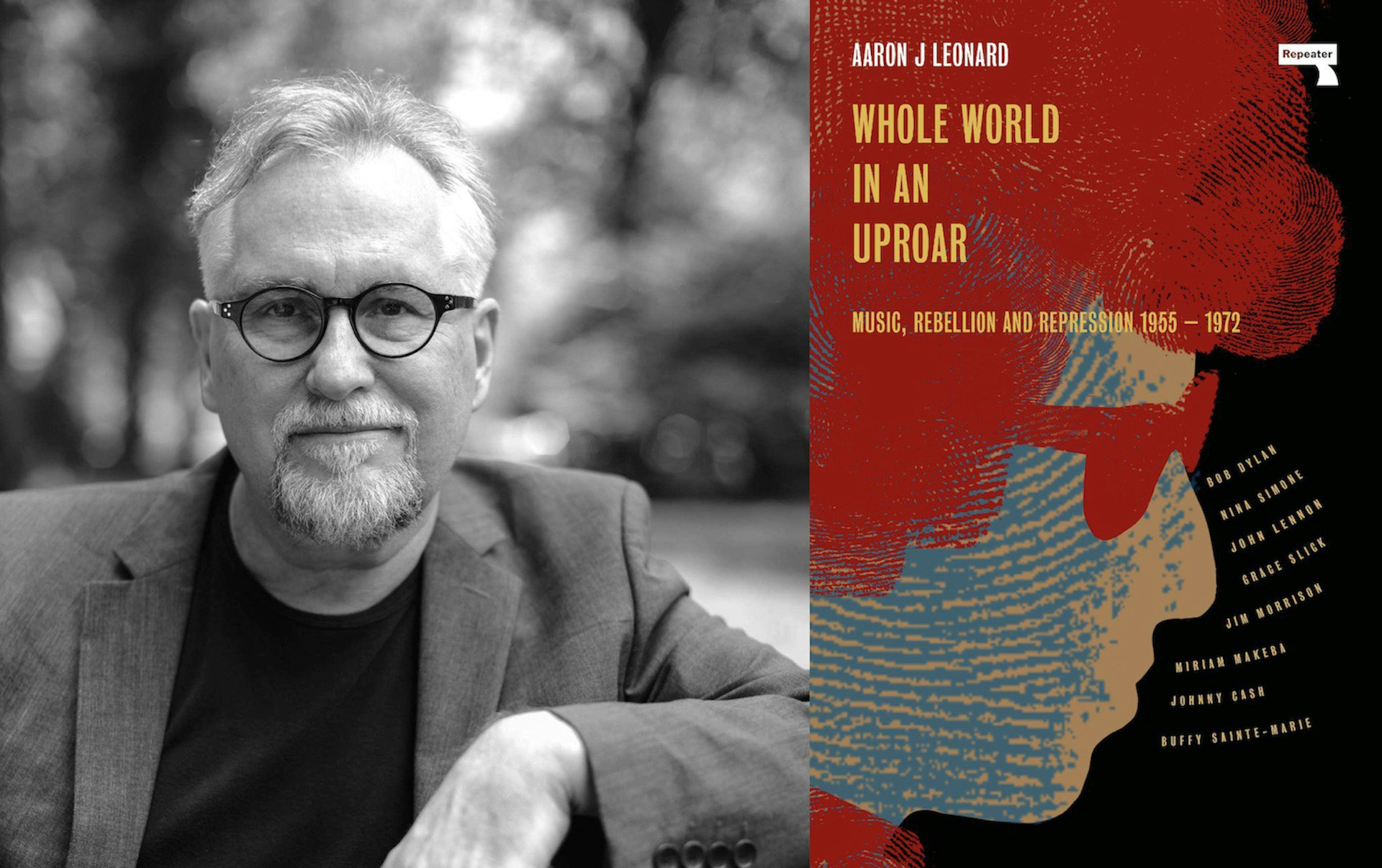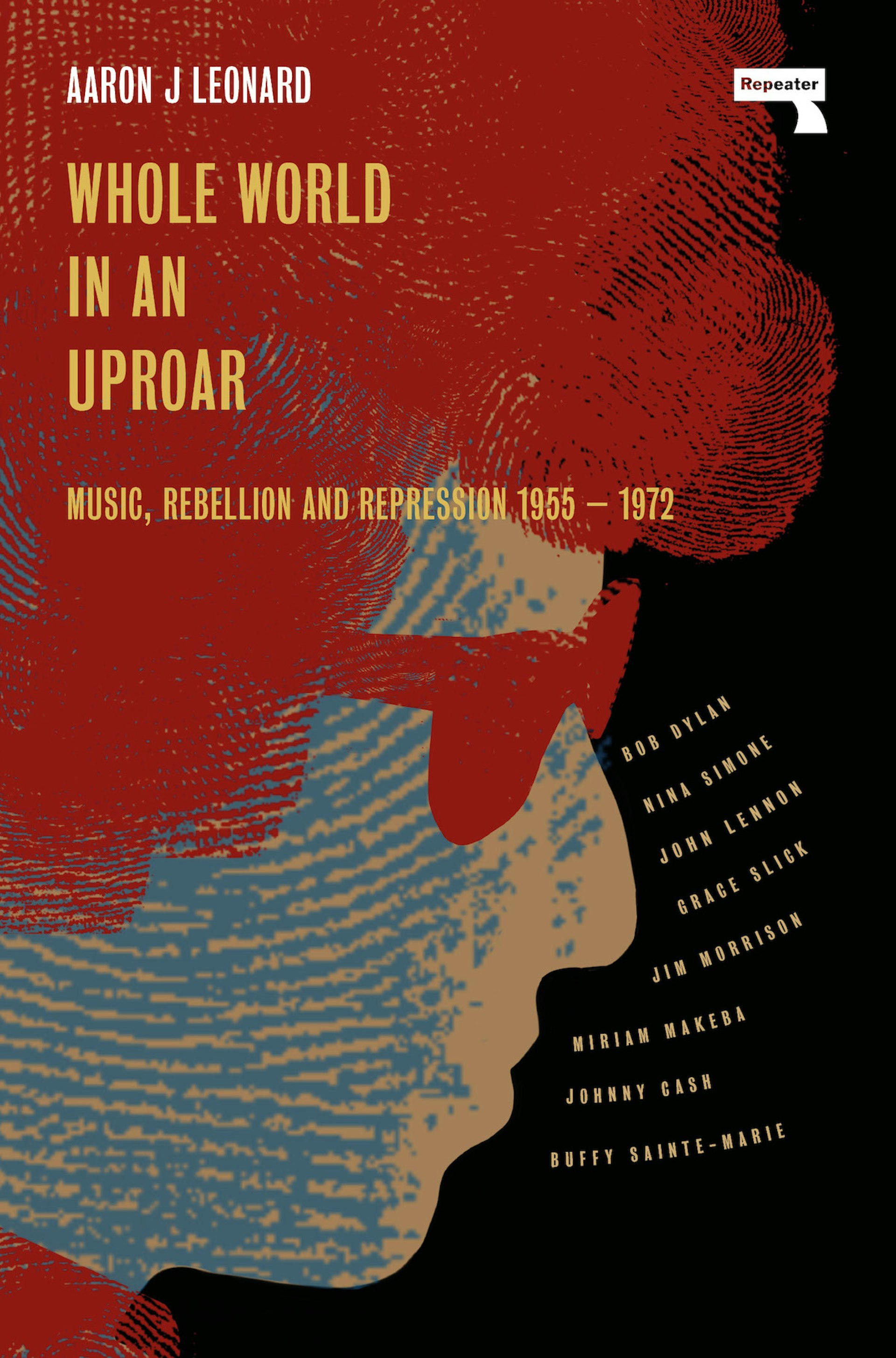
The birth and repression of radical music in the 1960s
- Text by Jeremy Allen
- Photography by Courtesy of Repeater Books
In his latest book Whole World In An Uproar, Aaron J. Leonard turns his focus to the resistance of rock and roll. The author of The Folk Singers and the Bureau, about the FBI’s suppression of the Communist Party in America in the 1940s and ’50s, presents a meticulously researched and fascinating trawl through post-war America, widening the scope this time by showing how the FBI, the CIA, and other less powerful municipal organisations sought to stymie and suppress progressives in popular culture.
The Los Angeles-based historian says that he had intended to write Whole World In An Uproar first, but he’d struggled to source enough material from Freedom of Information requests and documents stored in the National Archives, being informed that most files of the more radical artists he’d wanted to research had been destroyed. Latterly, he began gathering files from associates of the FBI’s most surveilled, such as Miriam Makeba – then wife of the Black Panther leader Stokely Carmichael – and even Suze Rotolo, the one-time girlfriend of Bob Dylan who shares the cover with the folk legend on the 1963 album The Freewheelin’ Bob Dylan. Both turned out to have extensive files, and Leonard was able to glean valuable, cached information.
At the heart of the book is a quote from John Ehrlichman, Assistant to the President for Domestic Affairs under the Nixon administration, who told the journalist Dan Baum in 1994 that there were two perceived enemies in American society – “the antiwar left and Black people” – adding: “we knew we couldn’t make it illegal to be either against the war or Black, but by getting the public to associate the hippies with marijuana and Blacks with heroin, and then criminalising both heavily, we could disrupt those communities.” The quote surfaced in Baum’s Harper’s Magazine article How To Win The War On Drugs in 2016, 17 years after Ehrlichman’s death, and while his family have publicly contested its veracity, Whole World In An Uproar contends that such activities were going on, irrespective of what Ehrlichman said or didn’t say.
We spoke to Leonard from his home in L.A., where he talked at length about the machinations of US powers during the period historians like to call “the long ’60s,” starting in 1955 and ending in 1972.

Huck: Although Whole World In Uproar is not exclusively about the FBI, the bureau does appear to be the main gatherer of counterintelligence. Was it your mission to expand the brief to include other agencies?
Aaron Leonard: I became very weary of received wisdoms, like being told over and over again that Altamont was the end of the ’60s. You know, I watched the movie, I loved the Rolling Stones in that period, the film is captivating. What happened at Altamont was awful by any measure, and yet it wasn’t just the Rolling Stones that made the outcome a disaster. It was the Mayor of San Francisco, who said: “You’re not going to play for free in our park,” and then north of San Francisco the [Altamont] Speedway says: “Unless you give us the film rights you’re not going to play here.” There were other forces involved other than the Rolling Stones. So of course, they have to take some responsibility, but they’re not the only ones. If you look at all the big rock festivals circa 1969/1970, there’s this incredible pushback: We don’t want this to happen here, we think it’s too far out. They don’t want to know about these hippies, who are actually being called ‘freaks’ at this point. So it’s not the FBI per se. It’s city councils. It’s park commissions. But then there is the FBI too.
Research throughout the book often pushes against the accepted narrative of what the ’60s was supposed to be about. Was that intentional from the start?
I’m very contentious against supposedly “the good ’60s” and then “the bad ’60s.” The good ’60s are Martin Luther King and ‘We Shall Overcome’ and the March on Washington and JFK, and then it all just went really bad. But there were riots throughout the ’60s going back to Jacksonville, Florida in ‘62. There’s this great quote from LBJ after the King Riots, and he says: “When you put your foot on a man’s neck and hold him down for 300 years, and then you let him up, what’s he going to do? He’s going to knock your block off.” Why would anyone think ripping up the Jim Crow process was going to be peaceful? From the Reconstruction Generation of 1870 through to after WWII where Black people had served heroically only to be told that now it’s time to go back to the status quo: when you finally rip that up, and people have the chance to assert their human dignity and freedom, yeah, it’s gonna be tough.
It was fascinating and also depressing reading about Miriam Makeba, who was all but forced into exile to Guinea in West Africa for the crime of falling in love with and marrying a Black Panther. How did you come by that information?
I knew she had married Stokely Carmichael, who came to be called Kwame Toure. I knew he was actually a “Black Messiah,” and was named as such in the memo that the FBI developed on how to target Black nationalist groups. I knew Stokely was a key target of the FBI and I knew he’d married Mariam Makeba, so I asked the National Archives for her file, and sure enough, the file came through and it’s extensive. Miriam Makeba’s file is pretty much all political. She gets targeted and suddenly nobody wants to do business with her. And she’s brilliant! She was just out of this world as a singer and an entertainer, but the FBI’s rules for Stokely were to essentially never let him out of their sight. So, as a couple, from the time they were together, they were never outside of the purview of the FBI, and it did affect her career.
Nina Simone, by contrast… I was not able to get an FBI file. I forget if they said it was destroyed or they just never responded. But I would be surprised if there was not a file on Nina Simone because she was another very vocal supporter of the most radical edge of the Black Freedom Movement. And Mississippi Goddam really stands up. I mean, it’s still a song that if you watch it in performance you get chills.
And she upped and left the US as well for a time for similar reasons, didn’t she?
Yeah, exactly. I mean, she has some personal claims. Unfortunately for these artists they’re not experts in tracing down FBI surveillance, because they’re artists. But there were very few artists performing in that period who were not partisan, and the ones that were cool had to be against the war against racism to be considered legitimate. And if you fucked up, like Blood, Sweat & Tears, then it was not cool to be on that side. Blood, Sweat & Tears famously toured Eastern Europe with government money; it seems like State Department money and maybe CIA money, and then they come back and they’re talking about how terrible communism is. And then they weren’t cool anymore. Eastern Europe was no worker’s paradise and I’m sure what they saw was shocking to them, but they were playing a role.
And James Brown doesn’t come off well does he, despite famously performing the Black Power anthem, “Say It Loud – I’m Black and I’m Proud”?
James Brown is Soul Brother no.1 and his job is being him. He very much wants to succeed and he has this whole notion that in the United States, you can pull yourself up by the bootstraps and be successful. I mean, it’s not true. Well, it’s true for him, but what’s true for him is not true for everyone else. So he does this song, “Say It Loud – I’m Black and I’m Proud,” because that is the mood of Black people in the United States at that point. They’re just shaking off any sense of inferiority that’s been put on them by a legacy of white supremacy. The song has a real positive element, but Brown never really puts in with the Black Freedom Movement in the way other black artists like Nina Simone or Miriam Makeba do, or someone more softly political like Marvin Gaye. It’s not radical, but it’s cool, which is still miles ahead of where James Brown is. He wants to wave the flag, he goes to the Nixon White House, and it’s polarising.
Whole World in an Uproar is available to order now through Repeater.
Follow Jeremy on Twitter.
Enjoyed this article? Like Huck on Facebook or follow us on Twitter.
